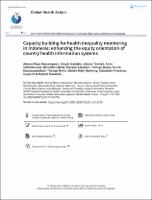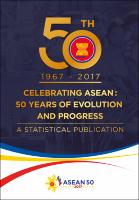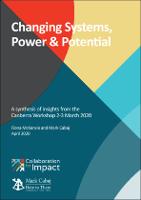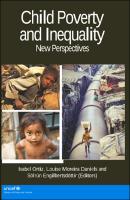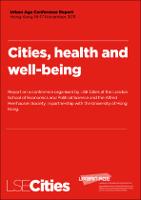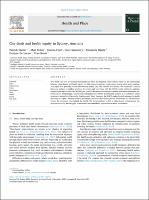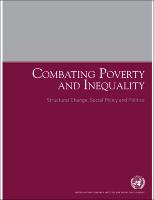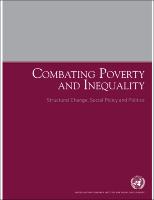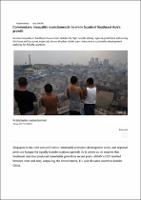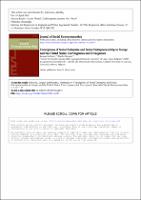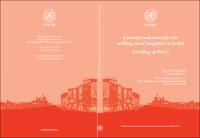Browsing by Title
Now showing items 52-71 of 299
-
Can mHealth and eHealth improve management of diabetes and hypertension in a hard-to-reach population? —lessons learned from a process evaluation of digital health to support a peer educator model in Cambodia using the RE-AIM framework
(2020-10-05)
Background: The burden of non-communicable diseases (NCDs) is increasing in low- and middle-income countries (LMICs) where NCDs cause 4:5 deaths, disproportionately affect poorer populations, and carry a large economic burden. Digital interventions can improve NCD management for these hard-to-reach populations with inadequate health systems and high cell-phone coverage; however, there is limited research on whether digital health is reaching this potential. We conducted a process evaluation to understand challenges and successes from a digital ... -
Capacity building for health inequality monitoring in Indonesia: enhancing the equity orientation of country health information systems
(2018)
Background: Inequalities in health represent a major problem in many countries, including Indonesia. Addressing health inequality is a central component of the Sustainable Development Goals and a priority of the World Health Organization (WHO). WHO provides technical support for health inequality monitoring among its member states. Following a capacity-building workshop in the WHO South-East Asia Region in 2014, Indonesia expressed interest in incorporating healthinequality monitoring into its national health information system. Objectives: This ... -
Celebrating ASEAN: 50 years of evolution and progress
(The ASEAN Secretariat, 2017)
A statistical publication released on the occasion of the 50th anniversary of the signing of the Declaration establishing the Association of Southeast Asian Nations (ASEAN). Since its foundation in 1967, ASEAN has made extraordinary progress in preserving peace and security, promoting economic co-operation and integration as well as social development. This publication presents a collection of statistical indicators from ASEANstats’ databases, and highlights the main findings observed to showcase the evolution and progress of ASEAN over the past decades -
Changing Systems, Power & Potential
(2020-03)
Mark Cabaj, President of the Canadian consulting company From Here to There and an Associate of Tamarack – An Institute for Community Engagement, worked with CFI to deliver a two-day workshop in March 2020 on Changing Systems, Power and Potential. CFI Network member Fiona McKenzie observed and synthesised the learnings, discussions and perspectives into a report which captures contributions from both presenters and participants. The result is a blend of concepts, frameworks, applications, hints and common threads that emerged about efforts to ... -
Chapter 11: Ethics and Health
(Community -focused nursing) -
Characteristics of distance education interventions and related outcomes in primary school children during COVID-19 pandemic: A systematic review
(2023-10-13)
The COVID-19 pandemic containment measures such as school closures remarkably disrupt the educational system, from in-person learning to remote or distance education with different interventions. This study aimed to identify the characteristics of interventions in remote or distance education during the COVID-19 pandemic and evaluate the outcomes of each intervention. A systematic review was conducted between October 2021 and May 2022 using four databases. Finally, 22 studies met the eligibility criteria and were included for data analysis. Most ... -
Child Poverty and Inequality: New Perspectives
(2012)
The 21st century starts with vast inequalities for children in terms of income, access to food, water, health, education, housing, or employment for their families. Half of the world’s children are below the poverty line of $2 a day and suffer from multiple deprivations and violations to basic human rights. More than 22,000 children die each day, and most of their deaths are preventable. This volume presents some of the critical acknowledged voices to move a necessary agenda forward. It explains multidimensional poverty measurements, describes ... -
Children and young people’s beliefs about mental health and illness in Indonesia: A qualitative study informed by the Common Sense Model of Self-Regulation
(2022-02-04)
Background: Mental illness is a leading cause of disease burden amongst children and young people (CYP). This is exacerbated in low- and middle-income (LMIC) countries which often have embryonic care structures. Understanding and targeting illness beliefs is a potentially efficacious way of optimising the development of health prevention interventions. These beliefs remain relatively underexplored in CYP in LMIC contexts. Aim: To develop an in-depth understanding of CYPs beliefs about mental health and illness in Indonesia. Methods and ... -
Cities, health and well-being
(2012)
Cities are critical sites for enquiry and action in relation to health and well-being. With up to 70 per cent of the world’s population estimated to be living in urban areas by 2050, global health will be determined increasingly in cities. In response to these challenges, the 2011 Urban Age Hong Kong conference, organized by the London School of Economics and Political Science and the Alfred Herrhausen Society in partnership with the University of Hong Kong, brought together over 170 planners, architects, sociologists, medical doctors, public ... -
City deals and health equity in Sydney, Australia
(2022-01)
City Deals’ are new governance instruments for urban development. Vast evidence exists on the relationship between urban factors and health equity, but little research applies a health equity lens to urban policy-making. This paper does precisely that for the Western Sydney City Deal (WSCD) in Australia. We conducted a critical discourse analysis of publicly available documents and interviews with the WSCD’s main architects, applying insights from relevant theories. We find ‘pro-growth’ discourse to encourage economic investment dominates any ... -
Closing the health equity gap: policy options and opportunities for action
(World Health Organization, 2013)
This report, which highlights policy options for consideration within national discussions, was developed in conjunction with WHO regional offices and others across the Organization who are working on the social determinants of health and equity issues. The general approach to the report was discussed at a seminar within WHO’s Information, Evidence and Policy cluster and with WHO regional advisors following the release of the final report of the Commission on Social Determinants of Health in August 2008. In January 2009 the 124th session of the ... -
Combating poverty and inequality: structural change, social policy and politics
(United Nations Research Institute for Social Development, 2010)
Poverty reduction is a central feature of the international development agenda and contemporary poverty reduction strategies increasingly focus on “targeting the poor”, yet poverty and inequality remain intractable foes. Combating Poverty and Inequality argues that this is because many current approaches to reducing poverty and inequality fail to consider key institutional, policy and political dimensions that may be both causes of poverty and inequality, and obstacles to their reduction. Moreover, when a substantial proportion of a country’s ... -
Combating poverty and inequality: structural change, social policy and politics
(United Nations Research Institute for Social Development, 2010)
Poverty reduction is a central feature of the international development agenda and contemporary poverty reduction strategies increasingly focus on “targeting the poor”, yet poverty and inequality remain intractable foes. Combating Poverty and Inequality argues that this is because many current approaches to reducing poverty and inequality fail to consider key institutional, policy and political dimensions that may be both causes of poverty and inequality, and obstacles to their reduction. Moreover, when a substantial proportion of a country’s ... -
Commentary: Inequality looms beneath the shiny facade of Southeast Asia's growth
(CNA, 2017-04-23) -
Community engagement to manage acute malnutrition: implementation research in Kupang district, Indonesia
(2019-09)
Objective: To improve the low coverage and performance of a programme on community-based management of acute malnutrition, implemented between October 2015 and April 2018 in Kupang district in rural Indonesia. Methods: To investigate why the coverage and performance were low in the first year of the programme, we conducted a semiquantitative evaluation between August and September 2016. We used the results from the evaluation to inform programme improvement, by developing and modifying community mobilization strategies. We employed a ... -
Conceptions of Social Enterprise and Social Entrepreneurship in Europe and the United States: Convergences and Divergences
(Journal of Social Entrepreneurship, 2010)
The concepts of social enterprise and social entrepreneurship are making amazing breakthroughs in EU countries and the United States. Until recently, the debates on both sides of the Atlantic have taken place in parallel trajectories with few connections among them. In the first part of the paper, we describe the European and US historical landscapes in which those concepts took root. In the second part, we analyse how the various conceptualizations have evolved. This analysis paves the way for the third part, in which we highlight the conceptual ...




